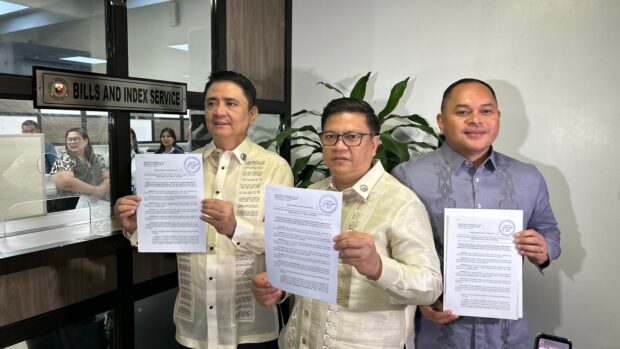House leaders file RBH 7, mirrors Senate version of economic amendments

Senior Deputy Speaker Aurelio Gonzales Jr., Deputy Speaker David Suarez, and Majority Leader Manuel Jose Dalipe file RBH No. 7, a resolution that mimics the Senate’s proposed amendments to the 1987 Constitution’s economic provisions. Dalipe said RBH No. 7 now seeks to to discuss amendments through a constituent assembly instead of a constitutional convention. (Gabriel P. Lalu/ INQUIRER.net)
MANILA, Philippines — House of Representatives leaders have filed Resolution of Both Houses (RBH) No. 7 — which mimics the Senate’s RBH No. 6 — to minimize discussions between the two chambers regarding possible amendments to the 1987 Constitution’s economic provisions.
Senior Deputy Speaker Aurelio Gonzales Jr., Deputy Speaker David Suarez, and Majority Leader Manuel Jose Dalipe on Monday filed RBH No. 7, entitled “A Resolution of Both Houses of Congress Proposing Amendments to Certain Economic Provisions of the 1987 Constitution of the Republic of the Philippines, Particularly on Articles XII, XIV, XVI”.
Dalipe said RBH No. 7 now aligns with the Senate’s RBH No. 6 — which means the House of Representatives now proposes the same economic provision amendments by way of a constituent assembly, which would likely result in separate voting for the two chambers.
“Ito, Resolution of Both Houses No. 7 talks of a constituent assembly, if you look back on Resolution of Both Houses No. 6 of the House of Representatives, it talks about constitutional convention — ‘yon po ang pagkakaiba no’n (that’s the difference),” Dalipe said.
“Now if you look deeper as I mentioned earlier, the provisions which we placed here is exactly the same (as) what the Senate placed, para wala nang iba pang storya, o wala nang iba pang mga iniisip o pangamba, so wala nang duda rin, so pinattern na talaga namin, kasi baka sabihin nila may iba pang version ‘yong RBH No. 6,” he added.
Article continues after this advertisement(Now if you look deeper as I mentioned earlier, the provisions which we placed here is exactly the same (as) what the Senate placed, so that there would be no other stories, so that they would not think of anything else or would have fears and doubts we patterned it so that they cannot say there is a different version of RBH No. 6.)
Under RBH No. 7, three sections would be amended:
- Section 11 of Article XII (National Patrimony and Economy), where the phrase “unless provided by law” is inserted in the provision that bars foreign ownership of a public utility shall except in a case where 60 percent of the total capital belongs to Filipino citizens.
- Section 4 of Article XIV (Education, Science and Technology, Arts, Culture, and Sports) where the phrase “unless provided by law” is inserted in the provision that bars foreign ownership of basic educational institutions except in a case where 60 percent of the total capital belongs to Filipino citizens.
- Section 11 of Article XVI (General Provisions) where the phrase “unless provided by law” is inserted in two portions: first, the provision that bars foreign ownership in the advertising industry except in a case where 70 percent of the total capital belongs to Filipino citizens; and in the provision that limits foreign investors participation in entities to how much their capital share is
The proposed amendments in RBH No. 7 are exactly identical to what was stated in RBH No. 6 filed by Senate President Juan Miguel Zubiri.
Camarines Sur 2nd District Rep. LRay Villafuerte hopes this would exhaust all measures for the Senate and the House to agree on the amendments — because originally, some lawmakers sought to open restrictions in five to six industries and not only three sectors.
“I think the proper word is that our action now is in line with our counterpart in the Senate. While they already filed RBH No. 6 […] as a co-equal partner in Congress, we are doing this so we can also start in House hearing discussions on this matter,” he said.
“Ito, very specific on the three provisions that we want to amend. And I just also want to make it clear, while there are certain restrictive provisions in the Constitution that other members feel should be amended, we no longer tackled that because we would rather work with what the Senate wants to amend so that there’s a basis of agreement,” he added.
The House of Representatives last March 2023 adopted RBH No. 6, which calls for amendments to the 1987 Constitution.
However, RBH No. 6 proposed a “hybrid constitutional convention” on the suggestions of retired Supreme Court chief justice Reynato Puno.
Using a hybrid constitutional convention means featuring both elected and appointed members in amending the Constitution, to allay fears that members of political families and business representatives would be in charge of making the changes.
However, the said proposal did not gain traction for the rest of 2023 — leading Speaker Ferdinand Martin Romualdez and Senior Deputy Speaker Aurelio Gonzales Jr. to say last December 2023 that they will look to discuss economic provision amendments in 2024.
Gonzales, however, said that a people’s initiative may now be considered since constitutional amendment proposals have died at the Senate. When the people’s initiative gained traction early January, the Senate accused the House of being behind the campaign.
All 24 senators signed a manifesto rejecting the same, saying that it seeks to abolish the Senate by introducing joint voting in deciding on the proposed constitutional amendments.
Speaker Romualdez and other House leaders have denied being behind the people’ s initiative and that they do not intend to abolish the Senate.
Eventually, the Senate filed its own version of RBH No. 6, which the lawmakers hoped would end the squabble between the two chambers.
However, tensions continued when the the House last February 5 adopted a resolution defending Speaker Romualdez from the Senate’s alleged ‘intense assaults’.